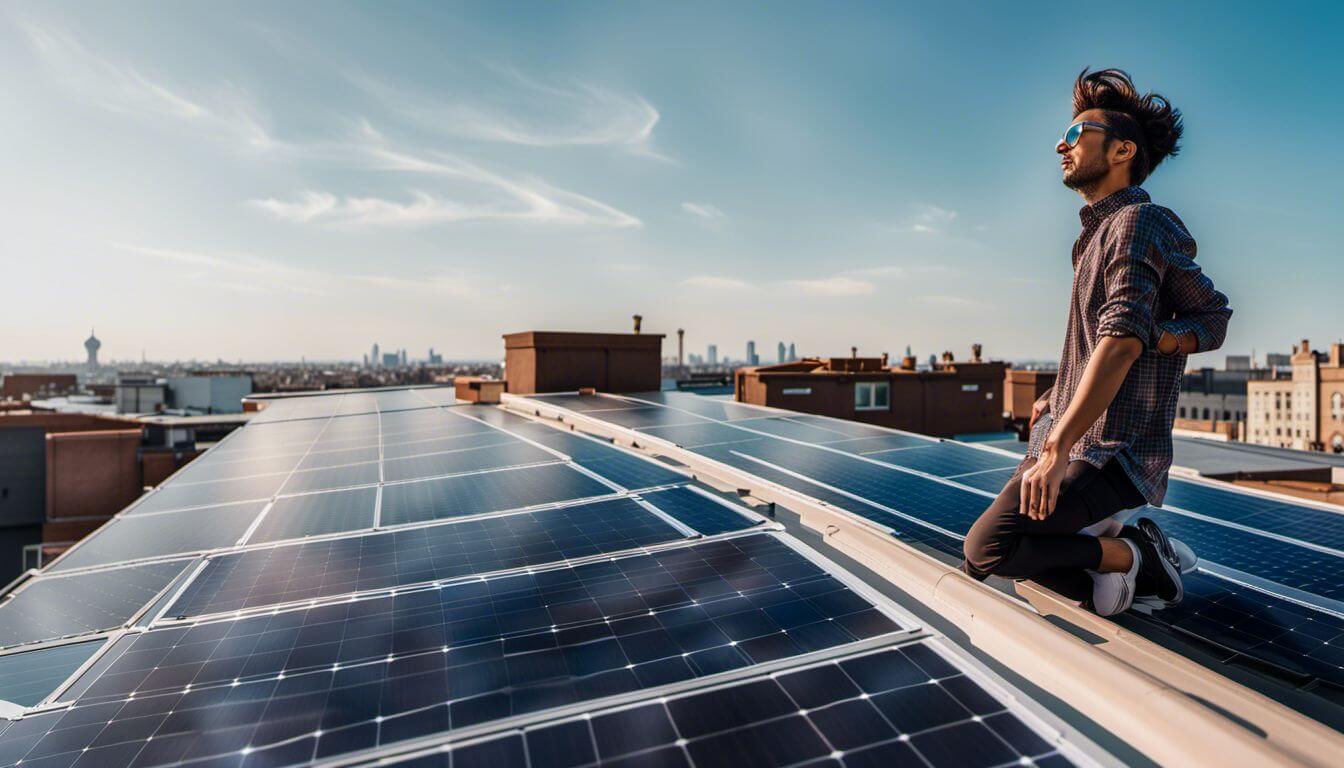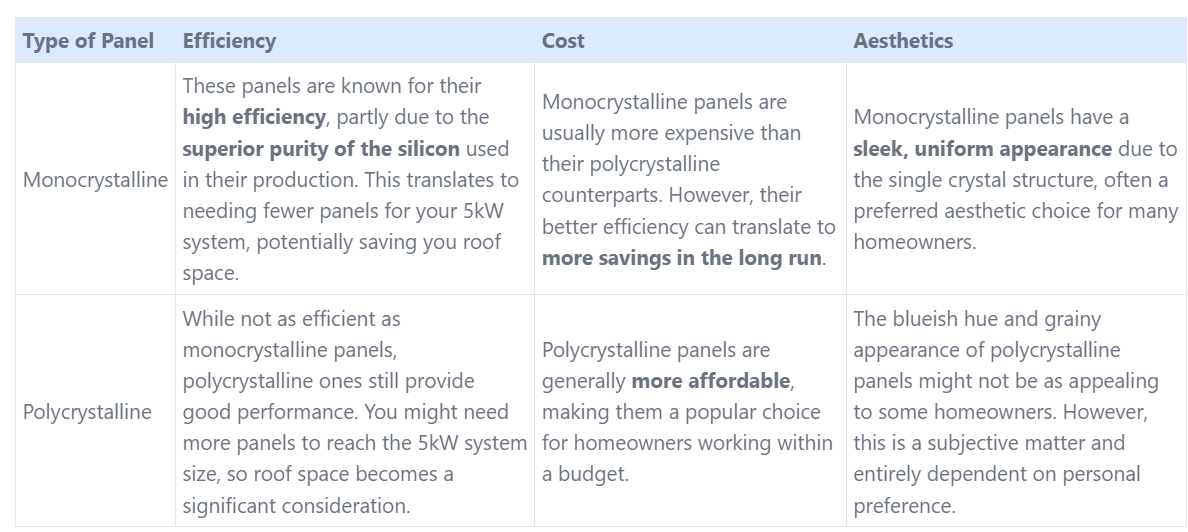- Home
- How to Use Solar Energy At Home
- How Many Solar Panels in a 5kw System
how many solar panels in a 5kw system-Unveiling the Mystery Behind 5kW System's Panel Quantity

Are you wondering how many solar panels are needed to build a 5kW system? While it's a popular choice for residential installations, identifying the correct number can be tricky. This article will take you through factors such as panel efficiency and wattage, simplifying calculations and helping you determine just how many solar panels your 5kW system needs.
Let's shed some light on this topic!
Key Takeaways
- The number of solar panels needed for a 5kW system can vary based on factors such as panel efficiency and wattage.
- On average, a 5kW installation requires around 15 - 20 solar panels, but professional assistance is recommended to ensure accurate calculations tailored to your specific needs.
- Factors such as monocrystalline vs. polycrystalline panels, efficiency, and wattage must be considered when determining the ideal number of solar panels for a 5kW system.
- A 5kW solar system typically requires around 25 - 35 square meters of roof space, with considerations for tilt and orientation to optimize performance.
Determining the Number of Solar Panels for a 5kW System
To determine the number of solar panels needed for a 5kW system, several factors need to be considered and a specific calculation method should be followed.
Factors to consider
Selecting the right number of solar panels for a 5kW system requires careful consideration. Here are the key factors you should take into account:
- Efficiency of the panels: Higher efficiency means fewer panels are needed. It refers to how well the panel converts sunlight into electricity.
- Wattage of each panel: Panels come in different wattages, commonly from 250W to 400W. Fewer high wattage panels are required compared to lower wattage ones for the same system size.
- Availability of roof space: Your roof's size and layout determine how many solar panels it can accommodate.
- Location and weather conditions: The amount of sunlight your location receives influences how much energy your solar system can produce.
- Type and brand of panels: Different brands offer varying levels of efficiency, durability, and performance which can affect the quantity you need.
- Professional installation requirements: Some systems may need expert assistance for proper setup, potentially influencing your choice in panel quantity and type.
- Desired energy output: If your goal is significant energy savings or reducing electricity bills, this will direct how many and what type of panels you opt for.
Calculation method
To determine the number of solar panels needed for a 5 kW system, you'll need to consider a few factors. First, take into account the wattage and efficiency of each individual panel.
On average, a 5 kW solar installation requires around 15-20 solar panels. Keep in mind that the exact number can vary based on these specifications. Additionally, consider the size and cost of the panels you choose as this can affect the overall performance and output of your system.
Remember, it's always best to consult with a professional who can help calculate and optimize your solar panel setup for maximum energy production.
When calculating how many solar panels are needed for a 5 kW system, it's important to factor in both the wattage and efficiency of each panel. On average, you will likely require about 15-20 panels to achieve a 5 kW installation.
However, keep in mind that this number may vary depending on factors such as brand and type of panels used. To ensure accurate calculations tailored to your specific needs, it is recommended to seek assistance from an experienced professional familiar with sizing rooftop systems.
The Ideal Number of Solar Panels for a 5kW System
When determining the ideal number of solar panels for a 5kW system, factors such as monocrystalline vs. polycrystalline panels, efficiency and wattage must be considered.
Monocrystalline vs. polycrystalline panels
When it comes to choosing between monocrystalline and polycrystalline panels for your 5kW solar system, it's important to consider factors such as efficiency, cost, and aesthetics. Let's take a closer look at the difference between these two types of panels.

Whether you opt for monocrystalline or polycrystalline panels, both types can effectively power a 5kW solar system. Ultimately, the choice will depend on your individual requirements, available roof space, and budget.
Efficiency and wattage
The efficiency and wattage of solar panels play a crucial role in determining the performance of a 5 kW solar system. Higher efficiency panels can convert more sunlight into electricity, allowing you to generate more power for your home.
Additionally, panels with higher wattage ratings can produce more electricity, maximizing the overall output of your system. When choosing panels for your 5 kW installation, consider opting for models that offer both high efficiency and wattage to ensure optimal energy production and cost-effectiveness.
By selecting efficient and high-wattage solar panels, you can make the most out of your 5 kW solar system and enjoy greater energy savings for years to come.
Roof Space Requirements for a 5kW System
Determining the amount of roof space needed for a 5kW system is crucial when planning your solar panel installation.
Average roof space needed
A 5 kW solar system typically requires around 25-35 square meters of roof space. The exact size needed can vary depending on factors such as the efficiency and wattage of the panels used.
It's important to consider your available roof space when planning for a solar installation, as this will determine how many panels can be installed and ultimately affect the energy production of your system.
With the right amount of roof space, you can maximize the potential of your solar system and generate enough electricity to power your home efficiently.
Considerations for tilt and orientation
To optimize the performance of your 5 kW solar system, there are some important considerations to keep in mind regarding the tilt and orientation of your panels. These factors can greatly impact the efficiency and energy production of your system. Here's what you should know:
- Tilt: The angle at which your solar panels are tilted can affect how much sunlight they receive throughout the day. To maximize energy production, it is generally recommended to set the tilt angle equal to the latitude of your location.
- Orientation: The direction in which your solar panels face also plays a role in their performance. In the northern hemisphere, south-facing panels tend to generate the most electricity. However, depending on your specific location and shading conditions, other orientations like east or west may also be viable options.
- Shading: It is crucial to place your solar panels in an area that receives maximum sunlight without any obstructions like trees or buildings casting shadows on them. Even partial shading can significantly reduce the output of your system, so take care when selecting a suitable location for installation.
- Tracking systems: Consider using tracking systems that allow your solar panels to follow the movement of the sun throughout the day. These systems can maximize energy production by continuously adjusting panel angles for optimal sunlight exposure.
Power Output of a 5kW Solar System
The power output of a 5kW solar system can vary depending on factors such as weather conditions and panel efficiency.
Estimated energy production
A 5 kW solar system can generate a significant amount of electricity for your household. On average, it has the potential to produce enough energy to power a typical home. However, the actual output may vary depending on factors such as your location and weather conditions.
With around 15-20 solar panels in a 5 kW system, you can expect to see substantial energy savings and a reduction in your electricity bills. It's important to note that the size and efficiency of the panels will impact the overall performance and output of your system.
By harnessing solar energy, you can contribute to a more sustainable future while enjoying the benefits of renewable power.
Factors that can affect output
Several factors can affect the output of a 5 kW solar system. These include:
- Location: The amount of sunlight your location receives will directly impact the system's energy production. Regions with more sunshine generally generate more electricity.
- Orientation and tilt: The orientation and tilt angle of the solar panels can affect how efficiently they capture sunlight. Panels facing south and tilted at an optimal angle tend to produce more power.
- Shading: Shade from nearby trees or buildings can significantly reduce the output of your system. It's important to ensure that your panels are placed in an area with minimal shading throughout the day.
- Temperature: Solar panels experience a decrease in efficiency as temperatures rise. High temperatures can lower the overall output of your system.
- Maintenance and cleanliness: Dirt, dust, or debris on the surface of the panels can obstruct sunlight absorption, reducing their efficiency and power output. Regular cleaning and maintenance are essential to keep them performing optimally.
- Panel quality: The quality and efficiency of the solar panels themselves also play a role in determining their output. Higher-quality panels with better conversion rates will generate more electricity.
- Inverter efficiency: The inverter converts the DC power generated by the solar panels into usable AC power for your home. Inefficient inverters can cause energy losses, affecting overall system performance.
- System age and degradation: Over time, solar panels can degrade slightly, which may result in reduced power output compared to when they were new.
More about how to use solar energy at home
FAQ
1. How many solar panels are typically needed for a 5kw system?
The number of solar panels needed for a 5kw system can vary depending on the wattage of each panel. On average, you would need around 20 to 22 panels with an average wattage of 250-300 watts each.
2. Can I use different types or sizes of solar panels in a 5kw system?
It is generally recommended to use the same type and size of solar panels in a 5kw system to ensure optimal performance and efficiency. Mixing different types or sizes may lead to imbalances in the system and affect overall output.
3. What factors should I consider when determining the number of solar panels for my 5kw system?
When determining the number of solar panels for your 5kw system, factors such as available roof space, sunlight exposure, energy consumption patterns, and desired energy output should be taken into account. Consulting with a professional installer can help determine the best configuration for your specific needs.
Conclusion-how many solar panels in a 5kw system
n conclusion, a 5kW solar system typically requires around 15-20 solar panels, but the exact number can vary based on factors such as panel wattage and efficiency. With an average roof space requirement of 25-35 square meters, a 5kW system is a popular choice for residential installations.
This size of solar system can provide significant energy savings and help reduce electricity bills for homeowners. Professional assistance may be necessary to ensure proper installation and connection to the electrical grid.